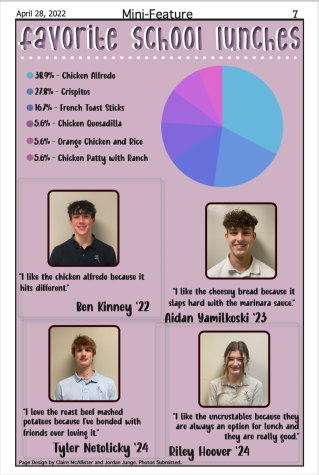A gallon of ketchup
November 12, 2020
In AP Literature and Composition, all students are required to read a dystopian novel to analyze in an essay. I spent much time deliberating which book to read out of the choices of 1984, The Handmaid’s Tale, and Fahrenheit 451. I based my assessments of the books mostly on the writing styles, as my enjoyment of a book and my subsequent grade on a paper relies heavily on how captivating an author’s writing style is to me. While all three books had beautiful, poignant lines, Fahrenheit 451, by Ray Bradbury, specifically caught my attention with many more examples of poetic phrases than the other two, seeming to fit my desire for a novel with a reflective and intricate style of writing. However, I have come to regret my decision sorely — although I have no issue with the content of the book, reading it was like drinking a gallon of ketchup.
I would like to preface my perfectly reasonable and accurate analogy by saying that I am not opposed to long, descriptive sections in writing. In fact, lines such as “She had a very thin face like the dial of a small clock seen faintly in a dark room in the middle of a night” and “faces with grey colourless eyes, grey tongues and grey thoughts looking out through the numb flesh of the face” were precisely what lead me to read this particular book. I fell in love with the poetic phrases, and looked forward to being surprised by the author at carefully planned moments with ingenious insights. However, I found that Bradbury had no such intentions of highlighting meaningful observations and artistic words — where more effective authors know how to ebb and flow in their writing to better emphasize powerful statements, Bradbury only knew flow. He wrote exclusively in these saturated sentences, which, while individually poetic, inundated the novel with painfully long pauses to delve into the symbolism of every miniscule detail. If the style of the book was summarized in a voice, it would be the loud, monotone voice of the person in the back of the Starbucks with no volume control, shouting to their cousin and describing their recent visit to the doctor about an unpleasant rash in excruciating detail while you sit staring at your coffee, desperately wishing you had brought earbuds.
Because of Bradbury’s refusal to distribute his deeply descriptive phrases in a reasonable and effective fashion, reading Fahrenheit 451 was almost exactly like being forced to drink a gallon of ketchup — sure, dipping fries in ketchup in small amounts to accentuate the flavor of the potatoes with the sharp flavor of the ketchup is wildly effective, but to sit and chug ketchup? It would not only be disgusting, but after a while, you would become numb to the flavor, and any ability to taste anything to its full extent, including ketchup itself, would be destroyed. Glug after glug — it would all be the same. Although Bradbury’s phrases can be beautiful on their own, the constant barrage of unnecessarily long paragraphs and emotional monologues at each and every mundane moment of the book numbs the reader, ultimately making points of importance in the story unextraordinary in both impact and style.
While I did not hate the novel and I believe it is a perfectly fine book to analyze for an essay, I do recommend that any students looking for an engaging and poetic book move along to 1984 or The Handmaid’s Tale. Unless, of course, you are looking to down a gallon of metaphorical ketchup.



